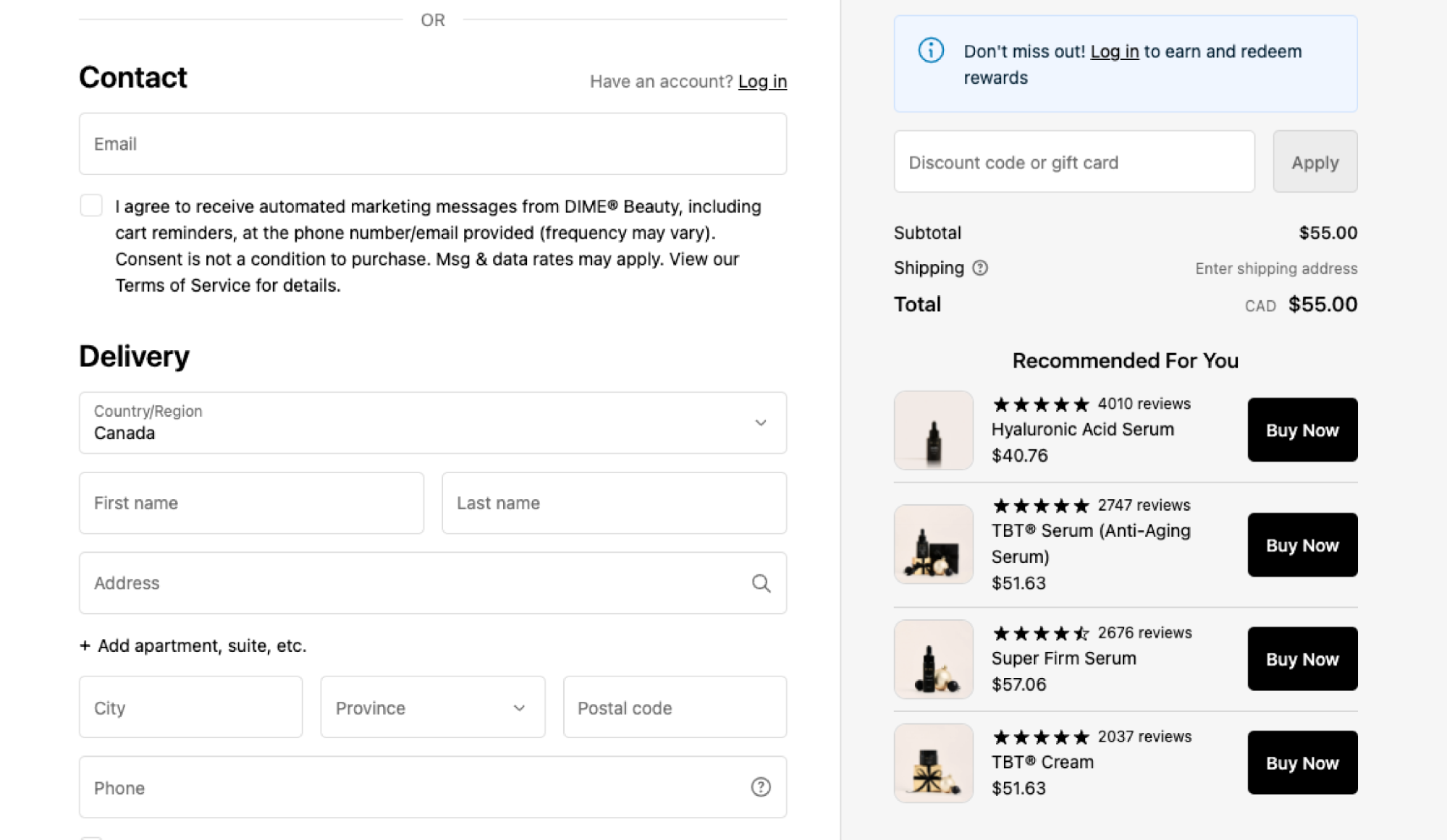35 eCommerce AI Use Cases to Grow Your Business Faster

Ever wonder why the ads and offers you see always seem to match your preferences so accurately? That's predictive analytics at work—a prime example of merchants using artificial intelligence (AI) to provide a more personalized shopping experience.
Picture this: You're eyeing a trendy jacket online. Predictive analytics suggests similar items based on your browsing and shopping history, acting like a personal stylist. For sellers, it's like having a crystal ball that predicts your next purchase.
Once a luxury, personalized shopping experiences are now the norm, and personal shoppers don’t have to deliver them. With nine out of ten businesses worldwide using AI-driven personalization to grow, it’s evident that AI isn't just a trend—it's a seismic shift reshaping online retail and evolving how businesses interact with customers.
Let’s explore how merchants use eCommerce AI to transform sales, enhance customer experiences, and optimize operations.
eCommerce AI use case: Marketing
Marketing isn't just about brand visibility—it's about personal connections. AI enables merchants to deliver personalized experiences, boost sales, and foster brand loyalty.
Marketing and customer segmentation
Predictive analytics uses AI to analyze data and predict customer behavior and preferences. Sellers can then segment audiences more effectively and run targeted campaigns that drive conversion rates and satisfaction.
Personalized email marketing
Email marketing is one of the most effective ways to reach customers, and AI takes it to the next level. Using customer data and AI, merchants can send customers personalized email campaigns, which leads to higher click-through rates and conversions.

Dynamic pricing optimization
Pricing strategies can make or break a sale. With AI, merchants can adjust prices in real time based on demand, competitor pricing, and customer behavior while maximizing revenue and profit margins.
More use cases:
- Marketing campaigns: Tailoring marketing efforts to each customer's preferences and behavior across all channels, not just email.
- Predicting customer lifetime value (CLV): Forecasting the future value of each customer to prioritize high-value customers.
- Content generation: Creating compelling and personalized product descriptions, email copy, and social media content.
- Voice search: Enhancing product discoverability and accessibility for customers with voice-activated devices (“Alexa, find me a new scalp-cleansing shampoo.”).
3 ways AI bolsters eCommerce marketing
1. Segment your audience.
Analyze customer data with AI tools to pinpoint demographics, purchase histories, and behavioral patterns. Targeted campaigns resonate with different segments and help you boost engagement and conversion rates.
2. Personalize your marketing campaigns.
Use AI-powered personalization techniques to craft customized messages and offers. Delivering relevant content based on preferences and behaviors increases engagement and drives sales.
3. Optimize content delivery.
Use AI algorithms to analyze the best times and channels for delivering marketing content. Tailoring delivery timing and platforms ensures your messages will reach your customers when they're most receptive, maximizing impact and conversions.
AI use cases in eCommerce: Personalized shopping
Personalized shopping experiences drive engagement and loyalty. AI helps sellers tailor experiences, drive satisfaction, and grow in a competitive market.
Product recommendations
AI-powered recommendation engines analyze customer data (i.e., behavior, purchase history, preferences) to suggest products that align with each shopper's interests. This helps reduce decision fatigue and increase conversion rates and average order values.

Promotions and discounts
AI-driven recommendation engines also help merchants offer customers tailored promotions and discounts aligned with shoppers’ preferences and buying patterns. These personalized incentives drive sales and create a better experience.
Visual search
Visual search helps shoppers search with images instead of text. Merchants use AI to offer features like virtual try-ons, which can often influence customers to buy since they more easily visualize how something might fit first.
More use cases:
- Real-time personalization: Adapting content, product recommendations, and promotions in the moment based on shopper behavior.
- Shipping options: Offering customized delivery methods and fulfillment choices aligned with customer needs.
- Product bundles: Creating custom product sets based on complementary items and shopper preferences.
- Product customization: Providing options like monogramming for customers to personalize products.
3 ways AI helps you personalize shopping experiences
1. Understand your customers.
Use AI to analyze your customers’ behavior and preferences and tailor experiences and product recommendations to individual shoppers.
2. Use recommendation engines.
Implement AI-powered recommendation systems to suggest products that align with each shopper's interests and past purchase history to boost conversion rates.
3. Offer personalized incentives.
Tailor promotions and discounts based on AI-analyzed buying patterns, and entice your customers with personalized offers that cater to their unique preferences.
See how you can offer more relevant product recommendations, boost AOV, and grow revenue with AfterShip Personalization.
eCommerce AI use case: Operations
Efficient operations are the backbone of any successful eCommerce business. With AI, merchants streamline processes, optimize resources, and craft top-notch customer experiences to make their business run more smoothly and increase sales.
Inventory management
With AI-powered inventory management systems, merchants can accurately forecast demand, prevent stockouts, and minimize excess inventory to keep customers happy.
Logistics optimization
To help products flow seamlessly from warehouse to doorstep, AI can help optimize delivery routes, manage transportation networks, and cut shipping costs and delivery times so orders get fulfilled faster and more affordably.
Forecasting revenue
AI-powered forecasting models analyze past sales, market trends, and other factors to predict future demand. This helps merchants stay ahead of customer needs, manage inventory efficiently, and make the most of new opportunities as they use AI to grow revenue.
More use cases:
- Churn prediction: Identifying factors contributing to customer churn and implementing strategies to retain valuable customers.
- Reviews authentication: Analyzing product reviews to distinguish between genuine and fake feedback.
- Counterfeit detection: Detecting counterfeit products and protecting customers from purchasing them.
- Fraud detection: Spotting potentially fraudulent activities to protect customers from unauthorized charges.
- Automated returns: Streamlining the returns process to improve efficiency and customer satisfaction.
3 ways AI can improve your operations
1. Forecast demand.
Use AI-powered forecasting to predict demand trends, optimize inventory levels, and meet customer demand effectively.
2. Streamline logistics.
Partner with AI-powered logistics providers to optimize delivery routes and cut shipping costs and delivery times.
3. Prevent fraud and counterfeit activities.
Implement AI-driven fraud detection to protect your business and customers from unauthorized charges and counterfeit products.
AI use cases in eCommerce: Customer support
AI is changing customer support, helping businesses offer customers more efficient, personalized assistance. With AI, merchants enhance support, streamline communications, and address issues quickly to create loyal customers.
Estimated delivery prediction
AI helps to predict accurate delivery dates using factors like shipping location and carrier performance. By providing reliable estimates, merchants can better manage customer expectations, reduce inquiries, and boost customer satisfaction, ensuring they get timely and transparent delivery information.

Customer service chatbots
AI chatbots provide real-time customer assistance by handling inquiries and resolving issues via chat. They offer 24/7 support, faster responses, and increased customer satisfaction. For merchants, they streamline operations, reduce workload, and cut costs.
Automated customer support
AI-powered customer support automates tasks like order tracking. It cuts business costs, freeing human agents for more complex issues, and customers get faster and more efficient service.
More use cases:
- Dynamic content optimization: Analyzing customer inquiries to craft personalized responses based on preferences and history and improve support efficiency.
- Sentiment analysis for customer feedback: Analyzing feedback to identify trends and areas for improvement.
- Voice commerce integration: Providing convenient, hands-free assistance through customers’ voice-activated devices.
3 ways AI can augment your customer support
1. Use chatbots for instant support.
Integrate AI-powered chatbots to provide real-time customer assistance, answering inquiries and resolving issues promptly, 24/7.
2. Automate repetitive tasks.
Use AI-driven automation to handle routine tasks like order tracking and returns processing, freeing up human agents for more complex issues.
3. Personalize support interactions.
Use AI to analyze customer inquiries and preferences, providing personalized responses tailored to each customer's history and preferences.
eCommerce AI use case: Product management
AI helps sellers streamline product management, from product tagging to trend analysis. With AI-powered product management solutions, merchants can improve product quality, relevance, and competitiveness to gain a competitive edge.
Deep product tagging
Tools like AfterShip Personalization use AI-automated product tagging to assign relevant attributes like color and style. This enhances product discoverability, improves search relevance, and personalizes the shopping experience, helping customers navigate more easily.
Automatically-generated product descriptions
Tools like Shopify Magic can automatically create unique, compelling product descriptions using attributes, specifications, and user-generated content. These tools save sellers time and resources and help ensure consistent and accurate product listings.
Product lifecycle management
AI-powered product lifecycle management (PLM) streamlines the entire product lifecycle—everything from design to disposal. Merchants use AI solutions to optimize product development, get them to market faster, maintain quality, and ensure shoppers get high-quality products faster.
More use cases:
- Trend analysis: Forecasting future product demand more accurately by analyzing historical data and market trends.
- Competitive analysis: Monitoring competitor pricing, products, and marketing strategies to inform decisions.
- Quality control and assurance: Detecting defects and anomalies in manufacturing to ensure product consistency.
- Inventory optimization: Optimizing stock levels, reducing stockouts, and improving efficiency.
3 ways AI helps you improve product management
1. Embrace deep product tagging.
Implement AI-driven solutions to assign relevant attributes to products based on image analysis automatically.
2. Automate the creation of product descriptions.
Use AI-powered tools to automatically generate unique and compelling product descriptions using attributes, specifications, and user-generated content.
3. Streamline product lifecycle management.
Adopt AI-powered PLM solutions to streamline the entire product lifecycle from design to disposal.
Use eCommerce AI to unlock success
AI is revolutionizing eCommerce. Merchants use it to enhance marketing strategies, optimize operations, and deliver personalized customer experiences. From predictive analytics to efficient support, AI-powered solutions offer sellers unprecedented opportunities to stay competitive and meet evolving customer needs—opportunities sellers shouldn’t ignore.
Learn how AfterShip Personalization drives personalized shopping experiences, boosts AOV and conversion, and accelerates business growth.

